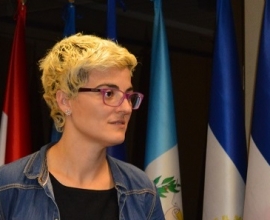The fight against gender violence in EUROsociAL
24/11/2014
PrintLuz Entrena Vázquez, the EUROsociAL expert managing the Fight Against Gender Violence Action (COMJIB)
The fight against gender violence in Latin America has been one of the leitmotifs of the EUROsociAL Programme in its contribution to increasing social cohesion in the region for two main reasons: the existence of very significant experiences in Europe in this area, such as the now 10-year old Comprehensive Law on Protection Measures enacted in Spain and the progressive positioning of the issue as a public policy priority on the agendas of Latin American countries.
With good reason, the equality of men and women and protecting women from violence occupies a leading role in the European Union-Latin America Dialogue. The efforts of public authorities and civil society on both sides of the Atlantic continue to be focused on reducing the incidence of a culturally-rooted phenomenon based on persistent inequality, how power is understood and the way that relationships between men and women have historically been structured. The challenge is therefore immense and represents one of the most important hurdles facing institutions, organisations and public decision-makers in the last two decades. The milestone that launched the process for American countries was the Belem do Pará Convention on preventing, penalising and eradicating violence against women, the 20th anniversary of which happens to be this year.
EUROsociAL accompanies institutions in the justice, security, health, employment and education sectors in the region as they explore and deepen public policy solutions to tackle a problem that is both global and multifaceted in its manifestations. The contributions have been varied, from national to regional, ranging from legislative support to the construction of coordination mechanisms and statistical measurement. Some of the most significant of these are indicated below:
April 2008. The Congress of the Republic of Guatemala approves the Law Against Femicide and Other Forms of Violence Against Women.
March 2009. Costa Rica launches the Unified System of Statistical Measurement for Gender Violence.
November 2013. Twenty Ibero-American Public Prosecutor's Offices approve the regional protocol for applying a gender perspective in the investigation of violent crimes against women committed in a domestic setting.
September 2014–February 2015. Brazil, Costa Rica, Ecuador, Nicaragua, Panama and Paraguay adopt the regional investigation protocol nationally through instruments adapted to the realities of each country, which has an impact on investigation by the Public Prosecutor's Office and its coordination with the police and security forces.
The work from institutions and for institutions at times leaves unaddressed the matter of improving people's living conditions—the ultimate objective of policies that often require lengthier processes to materialise—in terms of implementation on the ground. EUROsociAL now has a perspective, gained over nearly 10 years of work in Latin America through its two phases, and has noted in the demands coming from the institutions of the countries in the region that women today have more mechanisms and resources to ensure their effective access to justice and social services when victimised by gender violence.
The work perspective for 2015 includes improvement of assistance services to victims of violence in seven countries in the region, within the framework of the protocol for comprehensive assistance to victims backed by the Conference of Ministers of Justice of the Ibero-American Countries (COMJIB), and the momentum of over 30 institutions in different sectors which are committed to this process at the national level.

